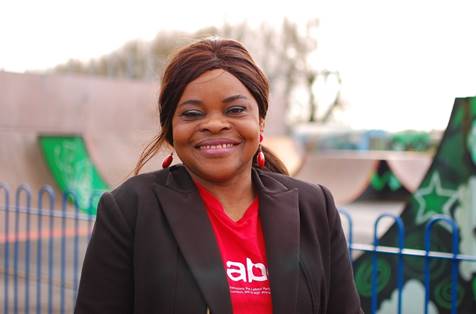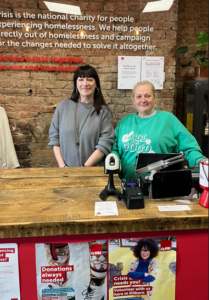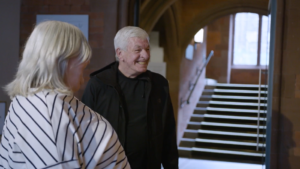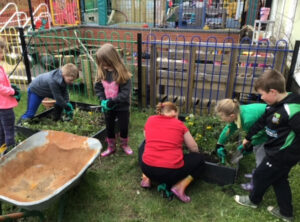FROM ASYLUM SEEKER TO PROSPECTIVE MP

Yolande Amana-Ghola is a committed key worker, a side-hustling supermum, and a top student at the University of Bolton.
Amidst the UK’s current cost-of-living crisis and the growing trend for working multiple jobs at a time, this former asylum seeker is carving out the beginnings of a political career that could unite our most over-stretched sectors.
Language Barriers
Yolande left The Democratic Republic of the Congo in 2002 and came to the UK alone, speaking French. After claiming asylum, she waited eight years for her residency paperwork to come through, during which time she was denied access to educational programmes which could have helped her develop her written and spoken English.
She said: “I was living in the UK, but I didn’t have the right to go to college. I was denied education as a destitute asylum seeker, at the end of the process when I’d exhausted every chance. There were no resources or public funding to support me, so I was left on my own.”
French is the official language of the Democratic Republic of Congo and is widely used in education and government. There are also four national languages: Kituba (Kikongo), Lingala, Swahili, and Tshiluba.
Cut out of the system, Yolande taught herself English independently, by reading the local Metro and watching TV.
Yolande said: “In my country, when you go to school, you study in French. Because I went to school there, French is my second language. When I found myself in England, I was struggling with understanding, but I did my best. Some of my colleagues would ask me to interpret for them when they were dealing with housing issues for example.”
Yolande met her husband and had her first child, now 16, in 2006. Two more children followed.
After being granted asylum, she finally made it to college, intending to return to a career in nursing. Having worked as a nurse in Central Africa, Yolande hoped to resume her career, but was prevented from making full use of her skills due to the UK not recognising nursing qualifications awarded by African French countries. Instead, she picked up shifts as a care assistant and support worker.
Volunteering for two local charities changed Yolande’s path from nursing to health and social care and geared her towards further study.
In 2015, when her youngest son was just 2 years old, Yolande embarked on a BSc in Health and Social Care at the University of Bolton and graduated with first class honours.
Her undergraduate studies were a constant juggle between nursery pickups, attending lectures and hospital shifts – both as a care assistant and in the vital role of interpreter. After completing her BSc, Yolande moved on to a PCGE 14+ course with ambitions to teach young people and adults and achieved another first class degree.
Currently, Yolande’s time is split between studying for her MSc in Social Care, Health and Wellbeing, whilst fulfilling her part-time role as a councillor for Salford City Council; a role she was elected to in 2022 after winning the hearts and minds of residents in Cadishead and Lower Irlam.
Yolande said: “Being a councillor is the starting point of political life. Every big name in politics started as a councillor. In my city, we’ve got 20 wards and every ward has three councillors. I am part of a team of three, representing the people in Cadishead and Lower Irlam. I act as a bridge between the community and the Council.”
Hardworking Values
It is possible to become a councillor through a political party, or as an independent individual. Having arrived in the UK at a time when the Labour Party was in power, Yolande felt moved by Tony Blair’s manifesto, which sought to support working-class people who were struggling in the community.
She said: “It’s not about the elites, it’s about the majority of the population. That is what I love about politics. I see myself as a working-class person and I saw that the Labour Party would represent me.
I was voting for them and supporting them, until in 2017 I was able to join the party and pay membership fees to attend meetings.”
A turning point came for Yolande on her undergraduate course at Bolton University when she began a new module on Social Policy, Equality and Social Inclusion.
She said: “That really changed my view and inspired me to become more active in my political life. I attended more meetings in the ward where I live and was actively campaigning to support our local MP. I saw that by becoming a councillor I could get more involved in community outreach activities.
Once my MP invited me to a women’s meeting which was all about inspiring other people. That meeting played a big role in my decision to get more involved in local politics, to serve the community. I thought “Okay, so if they can, I can do it as well.”
Growth Mindset
In 2021, Yolande was asked to represent her party in a ward where she knew there was little chance for her to win. However, Yolande knew that winning wasn’t everything and that by aligning a minority of supporters she would still be playing an important part. She also viewed it as an opportunity to learn.
Yolande said: “We were three women on that ward. We led a very big campaign, fighting for just one seat. We knew that two seats would be taken by the opposition, but that I was a contender for the third. I only lost by 100 votes, so we felt like we had made a difference and changed something.”
The following year, Yolande was asked to stand for election again, but this time for a different area of the city: Cadishead and Lower Irlam. The lady that Yolande was campaigning to replace had won with a margin of just six votes, so she felt intense pressure not to lose the seat. Yolande showed incredible resilience and after campaigning door-to-door in a ward where she wasn’t a resident herself, she secured her win in May 2022 with an 841-vote majority (1274 against 433 and 399).
Giving Back
Yolande has recognised the support provided at Bolton University, and the fact that her teachers saw the potential she had to help others.
She said: “I used Bolton University’s achievement pathway ‘LEAP Online’, where you can work on your Maths and English, as well as access career services such as CV writing. There is lots of support outside of your academic studies, and I took advantage of that. When I went into my second year, my teacher selected me to be a Peer Assisted Study Sessions (PASS) Leader.
As well as working and studying, I was a PASS Leader for two years, supporting other students with writing assignments, how to paraphrase, and how to reference properly. That’s when I was really able to grasp life at university.”
Whilst at university, Yolande also seized the opportunity to sign up for the Bolton Award. This flexible employability program is designed to give students work experience, helping them develop those all-important skills that employers look for.
On The Picket Line
Yolande is in the unusual position of having first-hand experience of both the UK’s education system and our healthcare system, as well as a deep appreciation for how public services are supported by local government.
In February 2023, nurses from 73 NHS trusts in England voted to strike. Teachers’ unions NEU and EIS also confirmed multiple dates of industrial action in February and March, affecting England, Wales and Scotland.
When asked for her perspective on the recent strikes, based on her personal experience, Yolande said: “I support the strikes, because people would never strike if they didn’t have a good reason. I know how hard it is for working-class people. I understand the cost of living. Everything is very expensive, so if people don’t get paid enough to live on, they have the right to demonstrate and ask for better conditions. Even my teacher at university went on strike.
When I look at immigration cases, people are taking the risk to die in the water because there is no way to live in those conditions. If people are put in a position where they can’t survive, they have the right to strike.”
No Slowing Down
With a first class PGCE 14+ under her belt, Yolande is in high demand as a supply teacher, but regularly has to turn down work to focus on her Masters and her role as a Councillor.
She said: “I pick up shifts when I feel that I can do it, but I’m already attending afternoon sessions at university straight after morning meetings with the Council. We deal with casework, attend meetings as part of a committee and I’m on several panels as well.”
Yolande chose to be on the Health and Social Care Scrutiny Panel, which was a key factor in her decision to study for a Masters course at Bolton University. Her other committee appointments include the Licensing and Safety Regulatory Panel (Taxis), Licensing Panel (Premises), and Salford Standing Advisory Council for Religious Education (SACRE).
Yolande said: “It’s a big challenge. I travel to university three times a week and sometimes I have to leave a lecture early to join a Council meeting. But the lecturers at Bolton have been great, they understand I have other responsibilities.
When I first got elected, I was going everywhere! I got told I need to slow down and learn to say “no”. I’m now much better at managing which meetings I go to in person, and when it’s OK to send my apologies. When I drive my son to football, I have to take my laptop and work instead of watching the match. But my family are incredibly supportive too.”
What’s Next?
After she completes her Masters, Yolande’s vision is to spend more time teaching and perhaps pursue a management pathway at a college. She also hopes one day to do a PhD… if she doesn’t beat the odds and end up becoming an MP!
Yolande’s unique experience, as an asylum seeker, a nurse, an interpreter, and a supply teacher, would surely make her one of the most well-informed and empathetic politicians in Britain. Whatever she does next, Bolton University will never forget how many bridges Yolande built while she was there.




